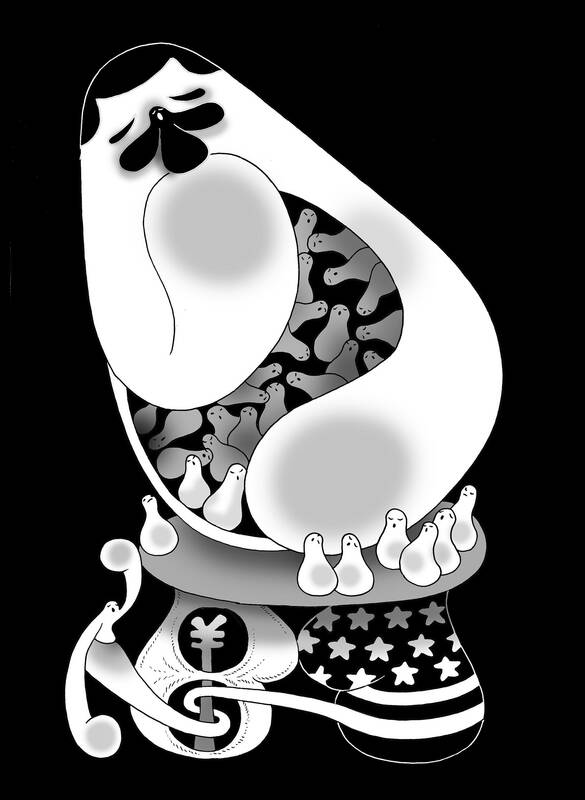“Mr Japan” finally has his trade deal, after three months of talks. It looks like it will be his final act.
After a third successive blow from the Japanese electorate, Japanese Prime Minister Shigeru Ishiba blinked in trade talks with the US. He spent months seeking a complete removal of the levies that US President Donald Trump held over the country, including those already imposed on cars.
“We will never accept tariffs, especially on autos,” Ishiba said in May, declaring the issue his red line.

Illustration: Mountain People
With vehicles long the main source of Trump’s ire — perhaps understandably, given that they account for more than three-quarters of the trade deficit — getting the president to back down was always going to be a tough ask, especially considering Japan’s lack of leverage.
However, after Sunday’s hammering in the upper house election, which has left the prime minister with a minority in both houses of parliament and arguably the worst electoral record of any Liberal Democratic Party (LDP) leader in history, Ishiba has seemingly accepted his fate. That is why he agreed to the deal that would include 15 percent tariffs across the board, including on cars.
With this last piece of business concluded, local media indicated that less than one year into his term, Ishiba would soon announce his resignation. The prime minister has subsequently denied the reports, which were made by multiple independent outlets.
Trade envoy and close aide Ryosei Akazawa painted a positive picture. It was “mission completed” in the tariff talks, he cheerfully wrote on social media, pointing to a picture hung in the White House of Ishiba and Trump speaking at the G7 meeting in Canada. He also denied any link between the agreement and the election results.
Certainly, markets were pleased, with automakers surging after being freed from months of uncertainty. Toyota Motor Corp rose by the most in nearly 40 years; the TOPIX headed for an all-time high.
Perhaps it is as good a deal as Japan could expect. As with all these agreements, the devil is in the details: It still puts a 15 percent levy across the board on imports. While that is less than the 25 percent tariff that was threatened, and most importantly less than the 25 percent already imposed on auto imports in May, it would still be damaging for exporters. There is an odd promise of US$550 billion in investment in the US, and a more logical agreement for Japan to buy more US rice. The part about Japan opening “to trade including cars and trucks” is confusing, given that there are no barriers currently in place.
However, perhaps Ishiba has done what he should have in the beginning, and simply told Trump what he wants to hear — knowing it would not, indeed cannot, be delivered.
The agreement also removes the last piece of leverage the prime minister had left — the “national crisis” he said must be prioritized ahead of infighting. That has been enough to keep the target off his back, until now. After Sunday’s results, it is clear he cannot be allowed to do any more harm.
In just 10 months, his weak leadership has resulted in an unstable political landscape that threatens to damage Japan for years. Conservative voters have deserted the LDP in droves — and headed to some disturbingly populist places. The landscape is so fractured that there is also not a viable opposition to take over, meaning the forecast is for parliamentary gridlock.
That is why the LDP needs to win voters back. With the trade deal about to be done, Ishiba should leave as soon as possible. Many conservatives are eyeing the anniversary of the end of World War II next month, fearing he would further alienate right-leaning voters by undoing the groundbreaking statement by late former Japanese prime minister Shinzo Abe on the 70th anniversary a decade ago.
It is not Ishiba’s fault that relations with the US have been so tarnished. That blame lies with Trump. By removing the uncertainty around tariffs, he would finally have done some good for the country, but he would leave Japan in a weaker position than when he took office — and in search of direction once again.
Gearoid Reidy is a Bloomberg Opinion columnist covering Japan and the Koreas. He previously led the breaking news team in North Asia, and was the Tokyo deputy bureau chief. This column reflects the personal views of the author and does not necessarily reflect the opinion of the editorial board or Bloomberg LP and its owners.
Having lived through former British prime minister Boris Johnson’s tumultuous and scandal-ridden administration, the last place I had expected to come face-to-face with “Mr Brexit” was in a hotel ballroom in Taipei. Should I have been so surprised? Over the past few years, Taiwan has unfortunately become the destination of choice for washed-up Western politicians to turn up long after their political careers have ended, making grandiose speeches in exchange for extraordinarily large paychecks far exceeding the annual salary of all but the wealthiest of Taiwan’s business tycoons. Taiwan’s pursuit of bygone politicians with little to no influence in their home
In a recent essay, “How Taiwan Lost Trump,” a former adviser to US President Donald Trump, Christian Whiton, accuses Taiwan of diplomatic incompetence — claiming Taipei failed to reach out to Trump, botched trade negotiations and mishandled its defense posture. Whiton’s narrative overlooks a fundamental truth: Taiwan was never in a position to “win” Trump’s favor in the first place. The playing field was asymmetrical from the outset, dominated by a transactional US president on one side and the looming threat of Chinese coercion on the other. From the outset of his second term, which began in January, Trump reaffirmed his
It is difficult not to agree with a few points stated by Christian Whiton in his article, “How Taiwan Lost Trump,” and yet the main idea is flawed. I am a Polish journalist who considers Taiwan her second home. I am conservative, and I might disagree with some social changes being promoted in Taiwan right now, especially the push for progressiveness backed by leftists from the West — we need to clean up our mess before blaming the Taiwanese. However, I would never think that those issues should dominate the West’s judgement of Taiwan’s geopolitical importance. The question is not whether

In 2025, it is easy to believe that Taiwan has always played a central role in various assessments of global national interests. But that is a mistaken belief. Taiwan’s position in the world and the international support it presently enjoys are relatively new and remain highly vulnerable to challenges from China. In the early 2000s, the George W. Bush Administration had plans to elevate bilateral relations and to boost Taiwan’s defense. It designated Taiwan as a non-NATO ally, and in 2001 made available to Taiwan a significant package of arms to enhance the island’s defenses including the submarines it long sought.